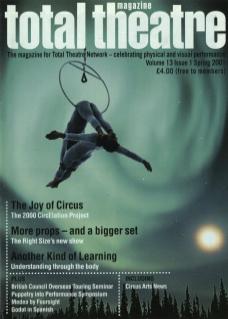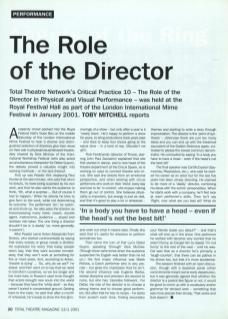A capacity crowd packed into the Royal Festival Hall's Voice Box on the middle Saturday of the London International Mime Festival to hear a diverse and distinguished selection of directors give their views on their role in physical/visual/devised theatre. Ably chaired by Dick McCaw of the International Workshop Festival (who also acted as simultaneous interpretor for Didier Guyon), the debate proved a valuable insight into working methods – or the lack thereof.
First up was Peader Kirk (replacing Paul Hunter at the last minute), who said that when he directs, he loves being surprised by his own work, and that he also wants the audience to think, 'Oh, what a surprise... But of course it had to happen.' When he directs he tries to give form to the work, while not determining its outcome. The performers 'do'; he watches and shuts up. He also sees the director as encompassing many roles: coach, double agent, metronome, audience... stupid and reckless risk-taker. The one thing a director shouldn't be is 'a daddy' (or, more generally, 'a parent').
After Peader came Anton Adassinski from Derevo, who started controversially by saying that every society or group needs a dictator. He expressed his worry that today people seem lazy, that they want success immediately, that they won't work at something for five or more years. And, according to Anton, ‘theatre is dying'... 'So, why do we act?' he asked, and then went on to say that we need to transform ourselves, so we live longer and live more lives. In Russia it used to be thought that actors brought new souls into the world – because they have ‘the white devil' – so they weren't buried in consecrated ground. Getting back to the topic, he said that after a month of rehearsal, he's ready to show the first glimmerings of a show – but only after a year is it 'nearly there'. He's happy to perform a show for years, to bring productions back years later – and likes to keep four shows going at the same time – in a kind of rep. (Wouldn't we all?)
Flick Ferdinando (director of Throat, starring John-Paul Zaccarini) explained that she first started in dance, and is now head of the theatre department at the Circus Space, so is working on ways to connect theatre and circus. She said she directs from an emotional perspective, and when working with circus performers who work on their ‘tricks' every day and ‘love to be in control', she enjoys making them go out of control. She believes physicality is important, but energy is just as vital, and that it's good to play a lot in rehearsal – and work out what it means later. Finally she said that it's useful for directors to perform sometimes too.
Then came the turn of Fiat Lux's Didier Guyon, speaking ‘through' Dick McCaw. (Though there were times when the audience suspected his English was better than he let on.) His first major influence was Bolek Polivka, a Czech performer who is very precise – but gives the impression that he isn't. His second influence was Eugenio Barba, whose discipline and precision are second to none, but who has 'clone-like followers'. For Didier, the role of the director is to choose a strong theme and to choose good performers. But after that he has no recipe – he starts from scratch each time, finding secondary themes and starting to write a story through improvisation. The director is ‘the point of synthesis' – otherwise there are just too many ideas and you can end up with the theatrical equivalent of the Golden Delicious apple, cultivated to please the lowest common denominator. He concluded by saying 'In a body you have to have a head – even if the head's not the best bit!'
The final speaker was Cal McCrystal (Spymonkey, Peepolykus, etc.), who said he started his career as an actor but for the last five years has been simply directing. He claimed to be more of a 'daddy' director, combining his ideas with the actors' personalities. When he starts work with a company, he'll first look at each performer's skills. Then he'll say 'Right, now what are you bad at? What do your friends tease you about?' – and that's what will end up in the show. One performer he worked with became very worried that he wasn't funny, so Cal got him to repeat ‘I'm not funny’ to the rest of the cast – until he was. Cal said that as a director he's primarily a ‘laugh-counter', that there can be pathos in his shows too, but that it's more accidental.
The session finished with an open discussion, though with a depleted panel (other commitments meant some early departures), but it was generally agreed that whether the director is a parent-like figure or not, it would be good to come up with a vocabulary and/or grammar for devised work – something that was more precise than simply, ‘That works and that doesn't.’
'In a body you have to have a head – even if the head's not the best bit!'

